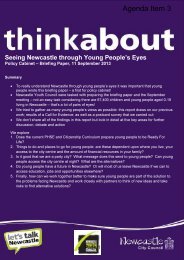NEWCASTLE'S MUSICAL HERITAGE AN INTRODUCTION By ...
NEWCASTLE'S MUSICAL HERITAGE AN INTRODUCTION By ...
NEWCASTLE'S MUSICAL HERITAGE AN INTRODUCTION By ...
Create successful ePaper yourself
Turn your PDF publications into a flip-book with our unique Google optimized e-Paper software.
famous Opera Impresario, Colonel J. H. Mapleson was presenting his Italian<br />
Opera Co featuring Therese Tietjens, possibly the greatest dramatic soprano of<br />
her time, Christine Nilsson, the Swedish soprano, the French mezzo, Zelia<br />
Trebelli and the Italian tenor, Allesandro Bettini, in a wide selection of operas<br />
including, ‘Norma’ and ‘Lucrezia Borgia’ (Bellini), ‘Il Trovatore’ and ‘Rigoletto’<br />
(Verdi) and ‘Faust’ (Gounod). Other singers and operas performed were Charles<br />
Santley in Wagner’s ‘Flying Dutchman’ (first Newcastle performance) and<br />
arguably Santley’s greatest operatic role, and Sims Reeves in Donezetti’s Lucia<br />
de Lammamoor, with Mde. Belle Cole, the noted Tyneside contralto. . There<br />
were also performances of ‘Les Huguenots’ by Meyerbeer and Audrans’s ‘Black<br />
Domino’. In February 1895 there was a performance of Arthur Sullivan’s comic<br />
opera ‘The Chieftain’, which had only had its premier in London some four<br />
months earlier. The Carl Rosa Opera, who had presented Charles Santley in the<br />
Flying Dutchman also, gave a first performance of The ‘Jewels of the Madonna’<br />
by Wolf-Ferrari. This violent story of jealousy and revenge in Southern Italy had<br />
only been given its first London performance a year earlier, which is another<br />
example of how well Newcastle was served with opera in the period up to the<br />
First World War. Carl Rosa was a German violinist and a gifted combination of<br />
musician and businessman. He started his first touring English opera company in<br />
1872. Three main elements contributed to Rosa’s success as an operatic<br />
impresario; his ability to spot embryonic operatic stars, his inspired programme<br />
building – mixing old and new, classical with popular - and his introduction of<br />
subscription tickets at all prices. He died in 1889 but his company carried on.<br />
During this period Italian opera was the craze and was what the ‘fashionables’<br />
wanted to hear. English opera on the other hand, came and went – venture after<br />
venture failed. The truth of the matter was that there was no comparison between<br />
the works produced by British composers of the time and the operas of Bellini,<br />
Donizetti, Rossini, Weber and not least, Verdi. There was also the fact that the<br />
Italian singers (although they were not all Italians) were excellent and it was not<br />
possible for any English singer to enter their ranks. It was this that made the two<br />
English singers mentioned above, Charles Santley and Sims Reeves, so<br />
outstanding in their day; They refused to adopt phoney Italian stage names and<br />
through sheer determination broke into the field of Italian opera and continued to<br />
hold there own amongst their Italian counterparts. Both singers appeared often in<br />
Newcastle but Sims Reeves must have had a special affection for the town, as it<br />
was in Newcastle that he made his stage debut in 1838 or 1839 at the Theatre<br />
Royal, Grey St., in the musical play, ‘Guy Mannering’. As previously mentioned,<br />
singers doubled as actors in these early days and the other way around, and a<br />
very young Reeves possibly got the part because he could sing as well as act.<br />
However, it was as a singer that he would triumphantly return many times and on<br />
one of these occasions in 1865/66, at a time when he was in such great demand<br />
in the provinces, Newcastle showed its delight on his arrival by greeting him with<br />
‘a merry peel of bells’ from the steeple of St Nicholas’.<br />
58

















